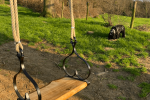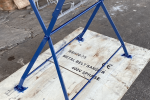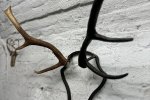
Interview
From land development technician to craftsman: how WUR alumnus Lucas Janssen started his own smithy
While many former Wageningers have found their way into scientific research or the corporate sector, Lucas took a completely different direction after his successful career at Deltares. He traded in his job as Head of the Catchment and Urban Hydrology Department to pursue his great passion of blacksmithing.
In an old brick factory on the outskirts of Wageningen, where bricks were once
made in a kiln, Lucas now enjoys practising the centuries-old blacksmithing craft. The handcrafted ironwork products that he makes in his smithy range from elegant hooks to sturdy fire baskets. His passion for metal started at an early age; one of his great-grandfathers was a blacksmith, and one of his grandfathers had a shipyard where dredgers were refurbished. He obtained his welding diploma from the technical school in Wageningen back in 1982. And whenever he went on holiday, he often photographed decorative ironwork like the magnificent gates with repetitive designs that are found in large southern European churches. In this account, he talks about how his career took such a surprising turn.
Studying in Wageningen
Lucas: “After I finished my pre-university education, I started looking for an academic study programme. I attended introductory days at WUR, Utrecht University and Eindhoven University of Technology, but soon realised that I preferred Wageningen because of its broad, applied nature. I chose the Land Development A study programme (Land Use Planning, Soil and Water), which offered a great deal of practical training. It was a proper engineering programme! I lived in the attic of a student house on Oude Eekmolenweg. Although the shower was always cold, I mostly have fond memories of our shared household, the parties and our vegetable garden. We also took regular trips into town to visit the cafes, theatre, cinema and the KEO workshop.
Student life in the different departments was also enjoyable. Once you had gained your Candidate’s B diploma, you had a lot of freedom when it came to choosing your courses. The internships took me to different places in the Netherlands and abroad. As a result, I did an internship in southern Limburg, spent two summers doing fieldwork in Spain and I spent six months in the US.
PhD in Remote Sensing and GIS
I graduated in 1987 in the midst of a period of high unemployment, which also affected academics. I was looking for something in the field of Remote Sensing, where job vacancies were also scarce. I became a ‘volunteer on benefits’ at the Department of Land Surveying and Remote Sensing, where I was able to study programming in more detail. After a few months, I was given the opportunity to do doctoral research in collaboration with the Institute for Land Development and Water Management (which subsequently became the Staring Centre and is now known as Wageningen Environmental Research).
After I obtained my PhD, I worked at several different places, including the Survey Department and the National Institute for Coastal and Marine Management (RIKZ) of the Directorate-General of Public Works and Water Management. I also spent some time as an associate professor at the Faculty of Geo-Information Science and Earth Observation (ITC), which is now part of the University of Twente. The last position I held was Head of Department at Deltares Research Institute. They were all great positions, with the main aspects being informatics and modelling in blue and green spaces.
Iron, fire and water
When I was about 55, I started to think about the future, and about the next step that I wanted to take and a new line of work. I wanted to do something that was creative, and practical, and something that involved direct customer contact that was either local or regional. And I also wanted to be my own boss. After exploring a few options, I finally arrived at blacksmithing. I initially took some courses and did an internship while I was still working at my job. I then started looking for a workshop and managed to find one at De Bovenste Polder, which was a former brick factory in Wageningen. After gaining two and a half years’ experience there by working evenings and weekends, I started my own business, Smederij Janssen [Janssen’s Smithy], at the same place in 2020.
The location is ideal. My smithy overlooks the Rhine, and I also restored the old chimney myself. When I am blacksmithing, I regularly take time to chat with passers-by and pedestrians, which is how I met a local man who used to be a blacksmith. He gave me some tools and a wealth of inspiration. The basis of my work is iron, fire and water, which is really all a blacksmith needs to create the most beautiful objects. Over the past four years, I have worked on many different projects and have never regretted my decision to become a blacksmith. Meanwhile, my specialisations include door and window grilles. My goal is to become proficient in my craft, and the best way to do that is by learning from other blacksmiths.
Workshops
In order to share my enthusiasm, I now also hold workshops for groups of up to four people. I help participants to gradually create their own ironwork, which they obviously get to take home.
Proud Wageninger
I will always be glad that I studied here; my time in Wageningen gave me a sollid founcation, took me to a lot of places and allowed me to meet some interesting people. I still find the engineering approach immensely satisfying."
Lucas' career took an unexpected turn, but even if you choose a completely different direction after graduating, the experiences, skills and contacts from Wageningen still prove valuable.
Additional information
- Interested in a similar WUR programme? Check out the Master Landscape Architecture and Planning
- Website Janssen’s Smithy | www.smederijwageningen.nl
- LinkedIn | Lucas Janssen
- Deltares | Enabling Delta Life, a knowledge institute that works on innovative solutions in the field of water and subsurface



